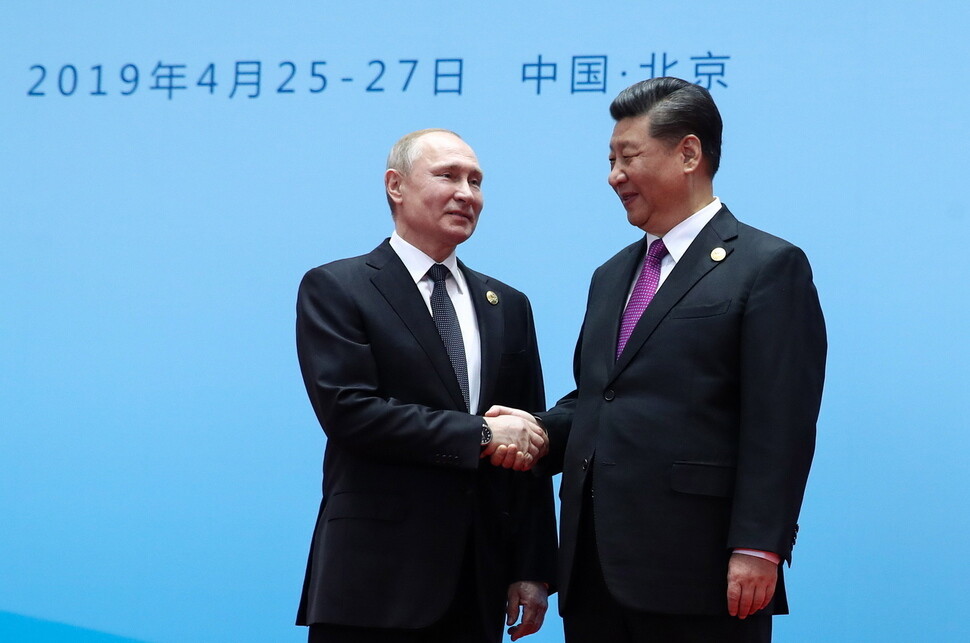hankyoreh
Links to other country sites 다른 나라 사이트 링크
China threatens strong countermeasures if S. Korea and US allies host US intermediate-range missiles

China has threatened that it “will not stand idly by” if the US deploys intermediate-range missiles in the territory of one of its neighbors, specifically warning South Korea, Japan, and Australia to “exercise prudence.”
During a press conference convened on Aug. 6 to address Washington’s plans to deploy intermediate-range missiles in the Asia-Pacific region, Fu Cong, director of the Chinese Foreign Ministry’s arms control department, urged China’s neighbors not to host US missiles, the Associated Press reported. This is the first time a Chinese official has gone on the record to criticize the US’ plans to deploy missiles in Asia.
“China [. . .] will be forced to take countermeasures should the US deploy intermediate-range ground-based missiles in this part of the world [that is, Asia],” Fu said, mentioning Australia, Japan, and South Korea by name.
Shortly after the US announced its withdrawal from the Intermediate-Range Nuclear Forces Treaty (INF), an arms control treaty between the US and Russia, on Aug. 2, US Secretary of Defense Mark Esper said during a tour of Asia that the US hopes to deploy intermediate-range conventional missiles to the Asia-Pacific region within a few months.
While Fu didn’t provide any details about what countermeasures China might take, he did say that “everything is on the table” if US allies welcome the missiles. Fu even brought up the 1962 Cuba missile crisis, a time of high tension between the US and the Soviet Union, while pointing to the significance of the US placing missiles “at the doorstep of China.”
Chinese Foreign Ministry Spokesperson Hua Chunying warned in a statement posted to the ministry’s website on Friday that China “will not allow any country to stir up troubles at our doorstep.”
In connection with this, Australia said on Aug. 5 that it hadn’t received a request from the US for deploying the missiles and ruled out the possibility of allowing that to happen in its territory.
China also reiterated that it had no intention of joining any trilateral talks with the US and Russia on nuclear arms control. “Given the huge gap between the nuclear arsenals of China and that of the US and the Russian Federation, I don’t think it is reasonable or even fair to expect China to participate in an arms reduction negotiation at this stage,” Fu said.
According to the Federation of American Scientists, the US’ nuclear arsenal consists of 1,750 nuclear warheads, Russia’s of 1,600 warheads, and China’s of 290.
In a related story, Russian President Vladimir Putin criticized the US decision to withdraw from the INF on Aug. 5 and called for negotiations to be held swiftly to prevent an arms race. Putin warned that, if the US produced missiles that had been banned under the treaty, Russia would begin developing similar missiles.
By Cho Kye-wan, staff reporter
Please direct comments or questions to [english@hani.co.kr]

Editorial・opinion
![[Editorial] Penalties for airing allegations against Korea’s first lady endanger free press [Editorial] Penalties for airing allegations against Korea’s first lady endanger free press](https://flexible.img.hani.co.kr/flexible/normal/500/300/imgdb/original/2024/0502/1817146398095106.jpg) [Editorial] Penalties for airing allegations against Korea’s first lady endanger free press
[Editorial] Penalties for airing allegations against Korea’s first lady endanger free press![[Editorial] Yoon must halt procurement of SM-3 interceptor missiles [Editorial] Yoon must halt procurement of SM-3 interceptor missiles](https://flexible.img.hani.co.kr/flexible/normal/500/300/imgdb/child/2024/0501/17145495551605_1717145495195344.jpg) [Editorial] Yoon must halt procurement of SM-3 interceptor missiles
[Editorial] Yoon must halt procurement of SM-3 interceptor missiles- [Guest essay] Maybe Korea’s rapid population decline is an opportunity, not a crisis
- [Column] Can Yoon steer diplomacy with Russia, China back on track?
- [Column] Season 2 of special prosecutor probe may be coming to Korea soon
- [Column] Park Geun-hye déjà vu in Yoon Suk-yeol
- [Editorial] New weight of N. Korea’s nuclear threats makes dialogue all the more urgent
- [Guest essay] The real reason Korea’s new right wants to dub Rhee a founding father
- [Column] ‘Choson’: Is it time we start referring to N. Korea in its own terms?
- [Editorial] Japan’s rewriting of history with Korea has gone too far
Most viewed articles
- 160% of young Koreans see no need to have kids after marriage
- 2Months and months of overdue wages are pushing migrant workers in Korea into debt
- 3Presidential office warns of veto in response to opposition passing special counsel probe act
- 4[Editorial] Penalties for airing allegations against Korea’s first lady endanger free press
- 5Historic court ruling recognizes Korean state culpability for massacre in Vietnam
- 6Hybe-Ador dispute shines light on pervasive issues behind K-pop’s tidy facade
- 7Japan says it’s not pressuring Naver to sell Line, but Korean insiders say otherwise
- 8[Guest essay] How Korea must answer for its crimes in Vietnam
- 9Story of massacre victim’s court victory could open minds of Vietnamese to Korea, says documentarian
- 10Historic verdict on Korean culpability for Vietnam War massacres now available in English, Vietnames